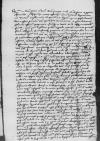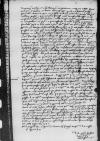Deputaverat me venerabile ⌊capitulum⌋ nostrum ad Reverendissimam Dominationem Vestram legatum, qui et postulationem Deo auspice peractam Vestrae Reverendissimae Dominationi denuntiarem, et gratulationis solemne officium exsequerer. Fuitque in votis, ut id absque cunctatione fieret, verum, cum capitularia quaedam negotia vetarent me ante quartam feriam ablegari constaretque proximo iam conventus publici die non vacaturum Reverendissimae Dominationi Vestrae, ut capitularia mecum transigeret vel his in se accommodare posset, quae ad prosequendum poss postulationis negotium restant.
Videbatur legatio mea ad Vestrae Reverendissimae Dominationis ex commitiis reditum diferenda, modo privatim ego hanc suspensionis causam Reverendissimae Dominationi Vestrae significarem excusaremque hanc moram ⌊capituli⌋, ne deserti officii crimen illi obiciatur. Facio igitur, quod mihi est imperatum, quamquam et mihi, et ipsi negotio erat conducibilius abrumpere merces, nam et post regressum Dominationis Vestrae Reverendissimae erunt res, quae aegre patientur me hinc discedere etc. Cum itaque ⌊capitulum⌋ suspendat officium suum, conveniet fortasse, ut idem faciat Reverendissima Dominatio Vestra in publice agendis gratiis, nam privatim id facere non erit ex indignitate Vestra, nisi fortasse plus honoris vellet impenderet principi illi sycophantico, qui semel acceptam non potest deponere personam, fabulam agens prorsus ridiculam nec usquam non sui similis, utcumque alienis se pennis subinde ornet.
Libet hic narrare, quae illius Theseus in capitulo ac seria actione post electionis omnibus intentis in risum solutus et, ut sibi videbatur, valde festivus adduxit. Ait se in ⌊Lithuania⌋ praesente aulicos regios in venatione ursum insignem in dumetum quoddam compulsum, cum iam vellent venabulis configere, innvenisse mortuum, sive metu, sive casu alio exanimatum. Quod cum ⌊regi seniori⌋ ibi praesente nuntiaretur, praecepisse, ut tecta re vera ⌊regem adolescentem⌋ in ursum confodiendum concitarent. Quod cum ⌊is⌋ impavide aggrederetur, risum esse citatum, quod ursum iam enectum confecisset. Quod commentum ⌊praepositus⌋ risu Democritico excipiens cum rogasset, quo hoc tenderet aenigma, ego subolfaciens conspirationem et obliquos morsus, dixi satis dictum sapienti. Verum postea me recollegens inveni rem quasi vaticinio dictam melius in illum competere, qui rem iam confectam adortus principem quoque se peractae rei pronuntiat. Sed hoc parerga.
Cum quidem velit Dominatio Vestra Reverendissima etiam hoc ex me scire, quemadmodum in ⌊capitulo⌋ res cesserit, rogo autem, Dominatio Vestra Reverendissima non patietur illas principis huius litteras perire, quibus illius propudium palam potest retegi, non semel in capitulo deos omnes testati numquam se affectasse episcopatum aliquem et honores tales sibi obvios repudiasse, cum nunc et Dominationi Vestrae Reverendissimae expatret praereptum sibi honorem et ⌊regiae maiestatis⌋ fidem impudentissime traducat et nescio quid de se provehendo a Reverendissima Dominatione Vestra deposcat. Sed iam ad rem ipsam.
 AAWO, AB, D. 2, f. 67v
AAWO, AB, D. 2, f. 67v
Mitto Reverendissimae Dominationis Vestrae decretum postulationis de ipsa factae, addito mandato venerabilis hidden by binding⌈[nerabilis]nerabilis hidden by binding⌉ ⌊capituli⌋ ad persequendum illud. Ex quo colliget et leget Reverendissima Dominatio Vestra, quemadmodum actus hic sit celebratus, rite quidem omnia, quantum ego sentio. Eiusdem exempli alterum apud me servo decretum, quod nuntius, qui ⌊Romam⌋ mittetur secum perferat. Mihi videtur maxime esse in rem Reverendissimae Dominanationis Vestrae, ut istud, quod nunc mitto, curet quamprimum per bancum ⌊Romam⌋ perferri ad dominum ⌊Theodericum de Rheden⌋, cui scribo ideo illud. Reverendissima Dominatio Vestra permittet, ut ipse ante adventum nuntii et auri (quod brevi sit subsecuturum), ne iacturam temporis faciamus, curet sine mora negotium committi atque in preambulis instrui, quo statim adveniente nuntio perduci ad finem possit, quod ita mihi videtur esse in rem nostram. Scribo nuntium secum allaturum mandata et omnia, quae ipse litteris suis mitti monet, ac de omnibus illum admoneo, quae poscere videtur res nostra. Opportune advenerunt litterae illius, quamvis nec si illis caruissimus, fuisset neglectum aliquid aut in aliquo aberratum a iusto.
Mandatis illis, quae petit in exordiis instruendi negotii, non indigebit neque multum opus esse arbitror novis commendaticiis ⌊regiae maiestatis⌋, quandoquidem mihi scribit commendationem et praesentationem iam pro me factam sufficere ad quosvis futuros eventus et litteras illas regias diligenter servari a cardinalibus nec oportere de alia praesentatione aliisve documentis me sollicitum esse. Idem puto eum dicere de commendatione negotii Reverendissimae Dominationis Vestrae, quod minus habet meandrorum quam meum. Pro maiori tamen securitate puto novas esse impetrandas atque ⌊Romam⌋ mittendas litteras rem praesentem prosequentes, quarum formulam iussu Reverendissimae Dominationis Vestrae conceptam ac priori voluntati regiae innitentem praesentibus mitto, nam ita videbatur stabilitati et auctoritati rei consultum iri. Si duplicatas, ut vocant, has litteras Dominatio Vestra Reverendissima obtinere posset, ut unum exemplum nunc cum decreto mitteretur, alterum nuntius afferret, esset consultissimum. Equidem scripsi domino ⌊Theoderico⌋ curaturos nos, ut nunc cum decreto eas accipiat litteras. Quod si non fiet, certior est de hoc faciendus per Reverendissimam Dominationem Vestram. Ego puto ⌊illum⌋ nobis fidelem et minime falsum futurum, quod etiam litteris ad me pollicetur, agens gratias, quod fidem ipsius ad ea negotia delegerimus, quaecumque hactenus acta per eum sunt, quamprimum cessa sunt evanescente coadiutoria, tamen praesentibus rebus nostris proxima bona ferunt et maxime praesentationem mei totam absolverunt. Reliqua coram cum Reverendissima Dominatione Vestra agam. Verum opus est Reverendissima Dominatio Vestra tempus mihi praescribat, quo debeo venire ⌊Lobaviam⌋, id enim non patiar praeterire, quin me ad omnia comparem, quae Reverendissimae Dominationi Vestrae erunt commodo et honori, tamen non potest res ad usque extrahi sine summo meo damno.
Mitto etiam Reverendissimae Dominationi Vestrae transumptum litterarum regiarum, quod ipsa petiit, agoque gratias illi permaximas, quod de mea dignitate evehenda ac ab aemulorum dentibus vindicanda tantum sibi curae sumat. Promitto me in hac re voluntati et amori Reverendissimae Dominationis Vestrae, quam tamen permonitam ac rogatam velim, ne amore mei seducta, velit praepropere quicquam aggredi ac ante rei maturitatem in hunc locum me impe[...] hidden by binding⌈[...][...] hidden by binding⌉, de quo ego pudefiam, quod quidem in tituli inscriptione, qua me Dominanio Vestra Reverendissima insigniter gravat, factum est, quod interpretor proclivitate amoris vestri, non iure meo fieri idque hactenus fero, si deinceps temperet Reverendissima Dominatio Vestra ab hac  AAWO, AB, D. 2, f. 68r immeritorum titulorum et compellationum occupatione meque ut ac servitorem suum et habeat, et vocet.
AAWO, AB, D. 2, f. 68r immeritorum titulorum et compellationum occupatione meque ut ac servitorem suum et habeat, et vocet.
Adiunxi ego, quod me facturum scripsi, formulam electionis, qua me ⌊capitulum Culmense⌋ ordinarie vocare ad suam ecclesiam posset. Quae res plus fortasse mihi honestamento esset et ad conscientiae tutelam accommodatior, modo ⌊regia maiestas⌋ non arbitretur hac re interpellari ius suum, a qua offensa levabitur capitulum, si praetexet facultatem ipsis in litteris meis a regia maiestae datam, ut videlicet eligant, addidi propterea et citationis permittendae formulam, et si res poscet, adibit eos quispiam ex nostris, qui rem rite gerendam dirigat. Verum omnia haec repono in iudicium et arbitrium Reverendissimae Dominationis Vestrae, quae quod sibi hac in re tutum bonumque videbitur, iubeat et efficiat, qualecumque id erit, non poterit mihi non placere. Noster princeps rubore totus perfusus est audiens regias litteras, cum transsummerentur legi, ac addidit mihi proficiat.
⌊Ludovicus⌋, scriba domini ⌊thesaurarii⌋, ⌊Gedani⌋ palam affirmaverat dominum ⌊Nybschitz⌋ propterea oratorem missum, ut inhibitione insinuata potestatem adimeret ⌊capitulo⌋ eligendi dicere written over d⌈dee written over d⌉tque ⌊regiam maiestatem⌋ nolle alium episcopum quam dominum ⌊praepositum⌋. Sed quid attinet haec stulta scribere.
Mandavit venerabile ⌊capitulum⌋, ut Reverendissimae Dominationi Vestrae, si posceret, mitterentur ex aerario episcopali pecuniae, quantascumque postulabit haec expeditio, putavit enim in commutando auro ac aliis curandis faciliorem habituram modum quam officiales nostros. Itaque suo iure potest Reverendissima Dominatio Vestra in hac re, quod volet, facere. Sufficere puto, ut conflentur mille aurei Ungari, quorum paucissimos dabit aerarium. Tanti non constabit postulationis expeditio, quanti electionis. Rogo Reverendissima Dominatio Vestra me quoque facere certiorem dignetur, quanti sibi constiterit episcopatus Culmensis expeditio et si quibus aliis de rebus viderit me admonitum oportere.
Non intellego, quo pacto possit esse provisum ⌊Hosio⌋ de praebenda Dominationis Vestrae Reverendissimae nondum vacante, aut quid prohibeat, quin Dominatio Vestra Reverendissima de illa, quod vult, possit efficere, nisi certa pactio sit facta ⌊regi⌋ a ⌊papa⌋ de non conferendo alteri hunc canonicatum nisi illi, quae servetur, necesse est. Alioqui iusta posset Dominatio Vestra Reverendissima excusatione uti apud reverendissimum ⌊dominum nominatum Cracoviensem⌋, qua etiam reginalem petitionem exclusit, quod hoc etiam honestius nunc faceret, ne videretur ⌊reginali maiestati⌋ iniuriam facere etc.
Satis iam mihi videor obtudisse aures Reverendissimae Dominationis Vestrae, quae nuper copiosas a me exegit litteras, sed ecce “Iliadem” ipsam incontinuam, nam tempus vix permisit recensionem. Boni igitur consulat Reverendissima Dominatio Vestra.
Remitto omnia ad me et per puerum meum, et per hunc Jobum missa, quorum multa mihi non vacavit legere, properanti, ut Reverendissima Dominatio Vestra ante abitum suum haec acciperet. Eidem me, ut domino et patrono, asservantissime commendo.
 AAWO, AB, D. 2, f. 68r immeritorum titulorum et compellationum occupatione meque ut ac servitorem suum et habeat, et vocet.
AAWO, AB, D. 2, f. 68r immeritorum titulorum et compellationum occupatione meque ut ac servitorem suum et habeat, et vocet.



